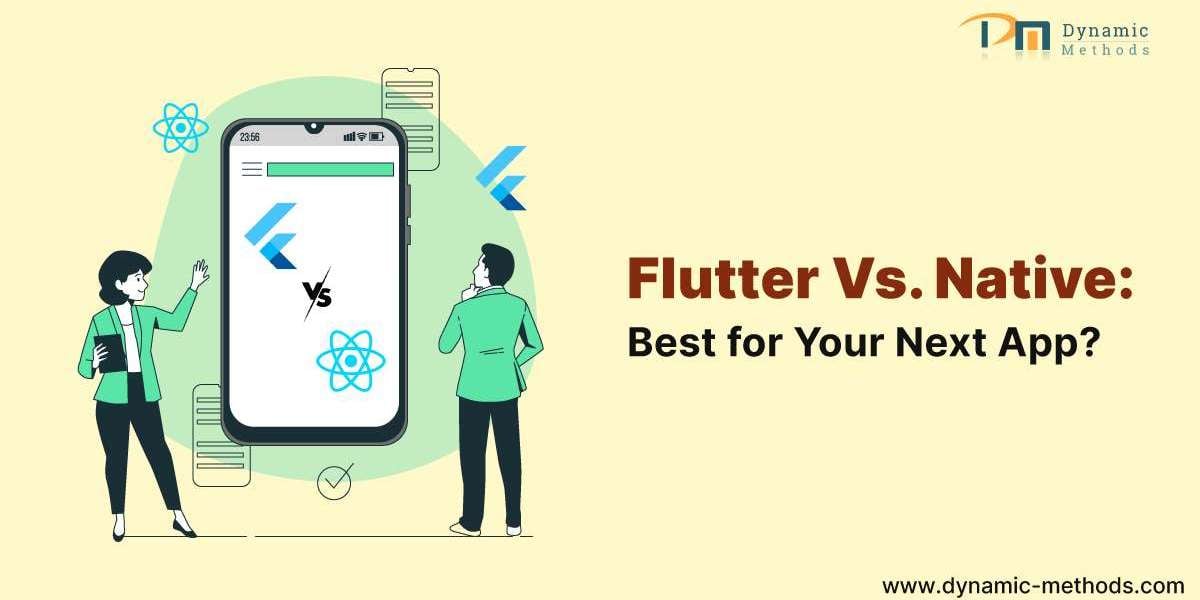In the fast-paced world of mobile app development, choosing the right technology can significantly impact the success of your project. Flutter and Native are two popular choices, each with its unique strengths and weaknesses.
This article aims to provide a detailed analysis of Flutter and Native app development, helping you make an informed decision for your next mobile app project.
Flutter: A Versatile Cross-Platform Framework
Flutter is Google's open-source UI software development toolkit, widely known for its capability to create beautiful and high-performing apps across multiple platforms using a single codebase. Let's dive into the aspects that make Flutter a compelling choice:
1. Hot Reload for Efficient Development
Flutter's "Hot Reload" feature is a game-changer for developers. It allows real-time code updates, making the development process faster and more efficient. Developers can instantly see the changes they make, reducing turnaround time and facilitating faster bug fixes.
2. Consistent UI Across Platforms
With Flutter, you can achieve a consistent user interface and user experience across various platforms. This uniformity is crucial in building a cohesive brand image and delivering a seamless user experience.
3. Rich Widget Library
Flutter offers a vast array of pre-built widgets, making it easy to implement various UI elements. These widgets can be customized, saving development time and effort.
4. Single Codebase for iOS and Android
One of the most significant advantages of using Flutter is the ability to write a single codebase that works on both iOS and Android platforms. This leads to reduced development costs and faster time-to-market.
5. Strong Community Support
Flutter has a vibrant and active community of developers who constantly contribute to its growth. The community provides extensive documentation, plugins, and packages, making the development process more accessible.
6. Fast Performance
Flutter apps are known for their excellent performance. The framework uses the Skia graphics library, which enables smooth animations and a delightful user experience.
Native: The Traditional Approach
Native app development involves writing separate codebases for each platform (iOS and Android) using the official programming languages and tools provided by Apple and Google. Let's explore the strengths of Native app development:
7. Platform-Specific Performance Optimization
Native apps can leverage the full capabilities of the underlying platform, resulting in optimized performance and seamless integration with the device's features.
8. Access to Latest Features
Native development provides immediate access to the latest features and updates introduced by the platform, allowing developers to stay at the forefront of mobile technology.
9. Native User Experience
By adhering to platform-specific design guidelines, Native apps offer a familiar user experience, increasing user engagement and satisfaction.
10. Broad Market Reach
Both the Apple App Store and Google Play Store have vast user bases. Developing a Native app allows you to tap into these existing markets and reach a broader audience.
11. Enhanced Security
Native apps often benefit from enhanced security measures provided by the platform, ensuring robust protection of user data.
Comparing Flutter and Native: A Head-to-Head Comparison
Now that we have explored the strengths of Flutter and Native individually, let's compare them side by side:
Aspect | Flutter | Native |
Development Speed | Hot Reload facilitates faster development | Separate codebases may slow down the process |
UI Consistency | Consistent UI across platforms | Native UI adheres to platform guidelines |
Pre-built Widgets | Vast widget library for easy UI development | Native offers platform-specific components |
Codebase | Single codebase for both iOS and Android | Separate codebases for each platform |
Performance | Excellent performance due to Skia graphics | Platform-specific optimizations |
Access to Latest Features | May require updates for new platform features | Immediate access to new platform features |
Flutter Vs. Native: Which is the Best Choice for Your Next Mobile App?
Choosing between Flutter and Native for your next mobile app development project is a critical decision that requires careful consideration. Let's take a deeper look at the factors to consider when making your choice:
1. App Complexity and Functionality
Consider the complexity and functionality of your app. If your app requires advanced platform-specific features and integrations, Native development might be more suitable.
However, for relatively simple apps with standard UI components, Flutter's cross-platform capabilities can save time and effort.
2. Development Team Expertise
Assess the expertise of your development team. If your team is experienced in platform-specific languages like Swift or Kotlin, Native development might be a natural choice.
On the other hand, if your team is well-versed in Dart (Flutter's programming language), Flutter development could be a smoother process.
3. Time-to-Market
Time-to-market is a crucial factor in app development. Flutter's single codebase and "Hot Reload" feature can expedite development, making it a preferred choice when speed is a priority.
4. User Interface and Experience
Consider the desired user interface and experience. Flutter's widget library offers a wide range of customizable components, while Native development allows you to leverage platform-specific design elements for a familiar user experience.
5. Budget Constraints
Budget considerations play a significant role in any project. Flutter's cross-platform approach can reduce development costs by eliminating the need to maintain separate codebases for iOS and Android.
6. Long-Term Maintenance
Think about the long-term maintenance of your app. Native development may require platform-specific updates and maintenance, while Flutter's single codebase might ease ongoing maintenance efforts.
Conclusion
Choosing between Flutter and Native for your next mobile app development project is a decision that requires a thoughtful evaluation of various factors. Both options have their strengths and are suitable for different scenarios.
Dynamic Methods is the best reliable mobile application development company in India. We have a team expertise building top class web, mobile app and software developments. Our company creates the best mobility solutions that enhance the customer experience. We deliver high performance mobile apps that help your business reach new heights. Talk with us.
Flutter's cross-platform capabilities, efficient development with "Hot Reload," and strong community support make it an excellent choice for startups and projects with budget constraints.
On the other hand, Native development excels in delivering platform-specific performance and a familiar user experience, making it ideal for complex and feature-rich apps.
Ultimately, the right choice depends on the unique requirements of your app, the expertise of your development team, and your long-term goals. Consider the factors outlined in this article to make an informed decision that aligns with your project's vision and objectives.
Feel free to leave a comment below, sharing your thoughts on Flutter Vs. Native and your experiences with mobile app development. If you found this article helpful, don't forget to like and share it with others in your network who might be facing a similar dilemma.
Thank you for reading!



